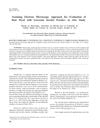July 2024 in “International Journal of Molecular Sciences” RF-based therapies might help treat hair loss.
 April 2024 in “Skin appendage disorders”
April 2024 in “Skin appendage disorders” Environmental pollutants can damage hair health and cause hair loss.
 June 2023 in “Stem cell reviews and reports”
June 2023 in “Stem cell reviews and reports” Stem cell therapies could be a promising alternative for hair loss treatment, but more research is needed to understand their full potential and safety.
 January 2016 in “Global dermatology”
January 2016 in “Global dermatology” A treatment called Cellcurin, combined with microneedling, significantly increased hair density and diameter in patients with hair loss.
 1 citations,
February 2022 in “Open Access Macedonian Journal of Medical Sciences”
1 citations,
February 2022 in “Open Access Macedonian Journal of Medical Sciences” Low zinc levels might contribute to early hair graying.
 October 2024 in “Journal of Cosmetic Dermatology”
October 2024 in “Journal of Cosmetic Dermatology” Over half of young people in Saudi Arabia experience early gray hair, linked to factors like smoking, stress, and family history.
 6 citations,
January 2010 in “Springer eBooks”
6 citations,
January 2010 in “Springer eBooks” SA linked to mitochondrial issues and oxidative stress, while AGA involves disrupted hair growth genes.
 1 citations,
October 1984 in “Clinics in dermatology”
1 citations,
October 1984 in “Clinics in dermatology” People distressed by minor skin changes should consult dermatologists with cosmetic expertise, and a public Cosmetic Dermatology Service with mental health support is recommended.
December 2021 in “Egyptian Journal of Dermatology and Venereology” Oxidative stress may worsen female pattern hair loss and could help track the disease and treatment.
 31 citations,
April 2019 in “Journal of Cutaneous Pathology”
31 citations,
April 2019 in “Journal of Cutaneous Pathology” Hair becomes gray and thin as we age, and while most hair loss in older people is due to genetics, there's a chance for gray hair to regain color under certain conditions.
2 citations,
September 2019 in “Neurology Neuroimmunology & Neuroinflammation” IVIg treatment improved symptoms but caused permanent dark hair loss.
 8 citations,
November 2019 in “International Journal of Morphology”
8 citations,
November 2019 in “International Journal of Morphology” Henna dye improves hair cuticle and thickness but effects vary by hair type and health.
 26 citations,
April 1999 in “Dermatologic Clinics”
26 citations,
April 1999 in “Dermatologic Clinics” The long-pulsed alexandrite laser is effective for hair reduction, particularly for light-skinned individuals with dark hair, but caution is needed for darker skin.
 20 citations,
September 2019 in “Nanomaterials”
20 citations,
September 2019 in “Nanomaterials” A portable device can create nanofibers to improve the appearance of thinning hair better than commercial products.
 August 2021 in “Journal of emerging technologies and innovative research”
August 2021 in “Journal of emerging technologies and innovative research” PRP combined with Ayurvedic medicine may effectively treat hair loss.
 September 2016 in “Princeton University Press eBooks”
September 2016 in “Princeton University Press eBooks” The document concludes that understanding health requires considering evolutionary perspectives on reproductive fitness, and recognizing the complexity of factors like diet, testosterone, and sexual orientation.
 March 2019 in “International Journal of Dermatology”
March 2019 in “International Journal of Dermatology” Hairline recession makes Asian males look older, especially in mid-young age; proper hairline position can help them look younger.
April 2022 in “Journal of Investigative Dermatology” Androgenetic alopecia causes hair thinning due to increased androgen activity, treatable with minoxidil and finasteride.
 November 2024 in “BMC Research Notes”
November 2024 in “BMC Research Notes” SIRT3 and SIRT7 genes may play a role in hair loss.
 January 2022 in “Sustainable development goals series”
January 2022 in “Sustainable development goals series” The document concludes that significant investment in agricultural innovation is necessary to achieve global food security and nutrition.
286 citations,
June 2012 in “Nature Immunology” Hair follicles help attract immune cells to the skin during stress.
 108 citations,
July 2004 in “American Journal of Pathology”
108 citations,
July 2004 in “American Journal of Pathology” Stress increases a factor in mice that leads to hair loss, and blocking this factor may prevent it.
88 citations,
May 2020 in “Clinical therapeutics” Stress can worsen skin diseases by affecting immune cells, hormones, and neurotransmitters in the skin.
 76 citations,
March 2005 in “Journal of Molecular Medicine”
76 citations,
March 2005 in “Journal of Molecular Medicine” Certain mice without specific receptors or mast cells don't lose hair from stress.
 31 citations,
January 2007 in “Journal of biological chemistry/The Journal of biological chemistry”
31 citations,
January 2007 in “Journal of biological chemistry/The Journal of biological chemistry” Stress activates a special function of the Vitamin D receptor with the help of c-Jun, which can also prevent cell death.
 30 citations,
September 2003 in “Experimental Dermatology”
30 citations,
September 2003 in “Experimental Dermatology” Minoxidil helps prevent stress-caused hair loss in mice.
 12 citations,
April 2020 in “British Journal of Dermatology”
12 citations,
April 2020 in “British Journal of Dermatology” Caffeine may help reduce stress-induced hair loss.
 7 citations,
April 2013 in “Clinical and Experimental Dermatology”
7 citations,
April 2013 in “Clinical and Experimental Dermatology” Tianeptine, an antidepressant, may prevent stress-induced hair loss in mice.
 6 citations,
December 2019 in “BMC Complementary and Alternative Medicine”
6 citations,
December 2019 in “BMC Complementary and Alternative Medicine” Alcohol extract from Vernonia anthelmintica seeds may help treat stress-related hair loss.
 September 2023 in “Медицинский совет”
September 2023 in “Медицинский совет” Minoxidil effectively treats stress-induced non-scarring hair loss.























